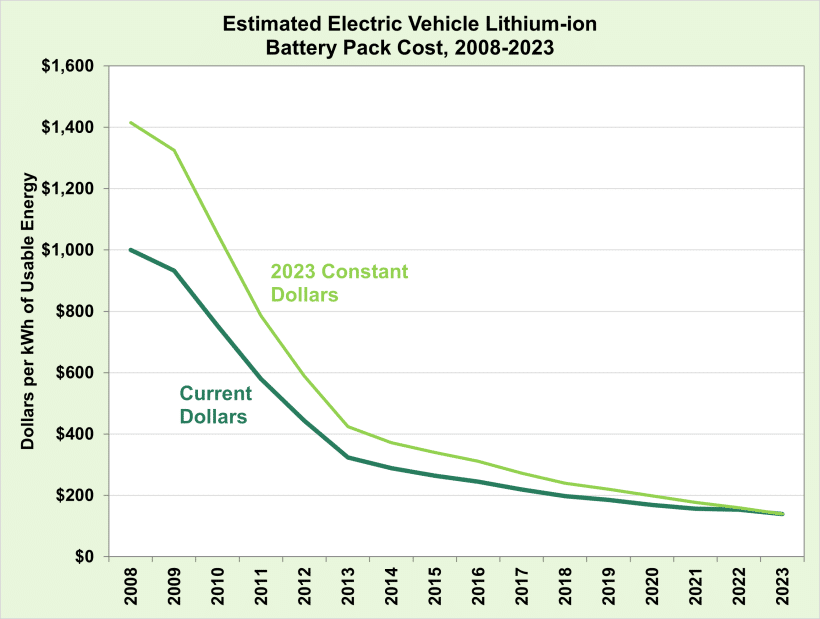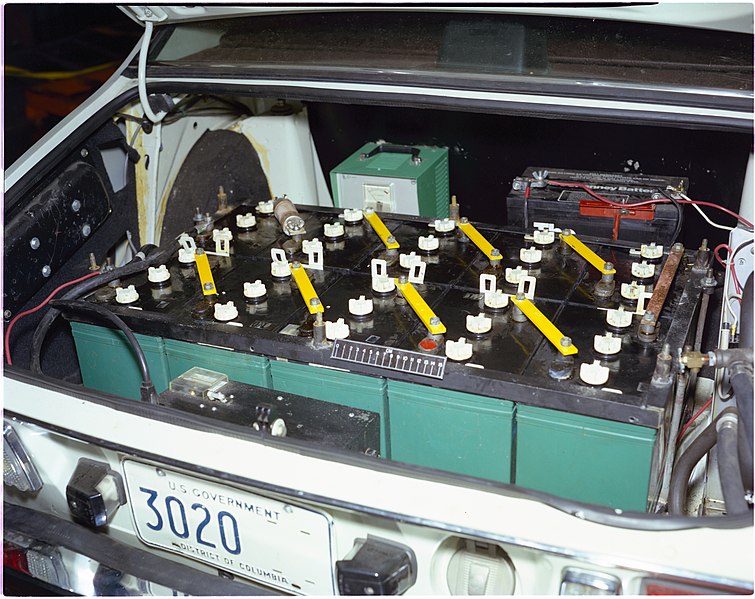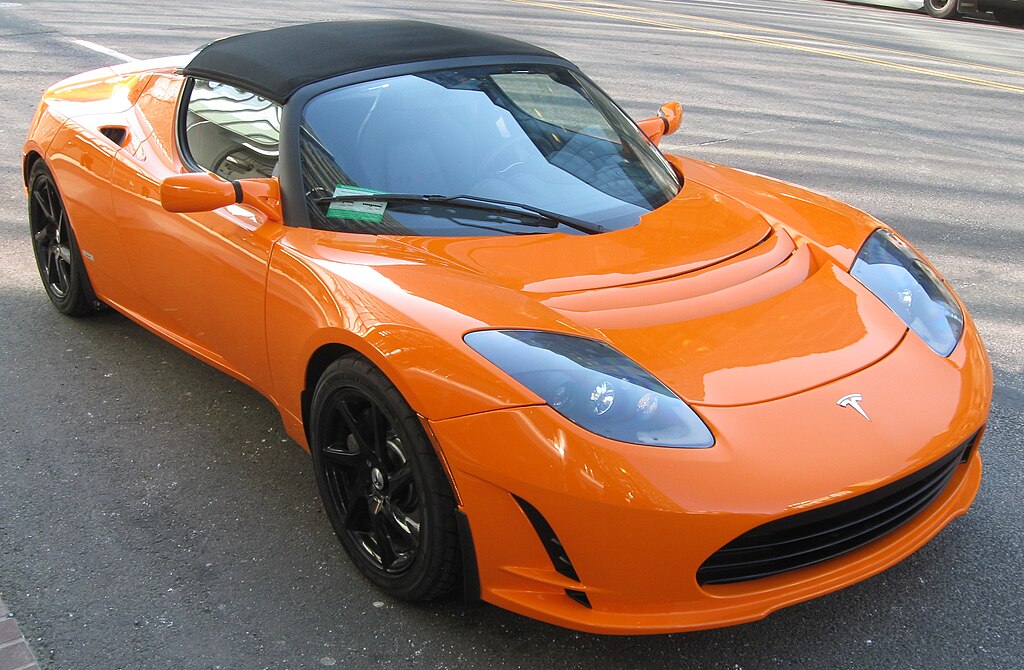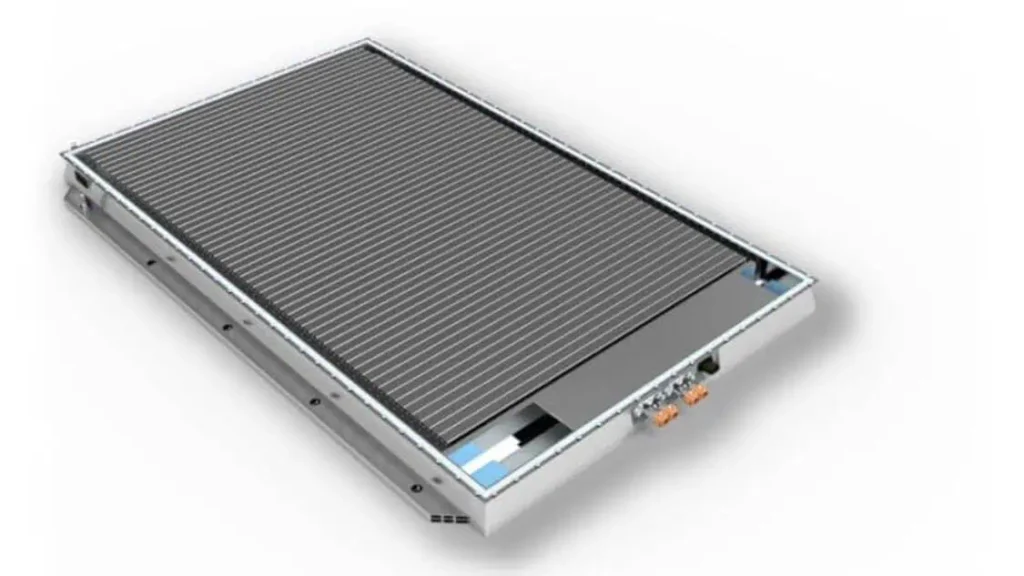EV Battery Pack Costs for LDVs in 2023 90% Lower than in 2008
The Department of Energy’s Vehicle Technologies Office reported a dramatic decrease in the cost of lithium-ion battery packs for light-duty electric vehicles. Between 2008 and 2023, the cost fell by 90%, from $1,415 per kilowatt-hour (kWh) in 2008 to $139/kWh in 2023, adjusted for constant dollars. This reduction is attributed to advances in battery technologies and chemistries, improved manufacturing processes, and increased production volumes.

Battery History
Electric batteries, which store chemical energy and convert it into electricity, were first invented by Italian physicist Alessandro Volta in 1800. This groundbreaking innovation has become essential for powering a wide array of modern technologies, including laptops, smartphones, satellites, and electric vehicles (EVs). Lead-acid were the first type of batteries used in electric vehicles.

Lithium Breakthrough
In the 2010s, auto manufacturers shifted from lead-acid to lithium-ion batteries, largely inspired by Tesla’s success with the Roadster, introduced in 2008. Tesla was a pioneer in this transition, using 6,831 lithium-ion cells in each Roadster to enhance efficiency. The Roadster’s ability to travel 200 miles on a single charge demonstrated the potential of advanced EV batteries, sparking hope for a competitive alternative to gas-powered cars.

This innovation paved the way for other mass-produced EVs, such as the Nissan Leaf and the Renault Fluence Z.E., which also adopted lithium-ion technology. Over the past decade, EVs have made significant strides in range and overall consumer appeal, positioning themselves as more practical options.
Despite currently holding a smaller market share, EVs are projected to make up 45% of new car sales by 2035, indicating a major shift in the automotive industry. While lithium-ion batteries remain the most efficient mainstream option, ongoing research continues to advance battery technology.
Cheaper Batteries Will Lead to ICE Price Parity, Experts Say
The average price of an electric vehicle was $56,371 in June, compared to gas-powered vehicles at $48,644, according to Kelly Blue Book.
Alan Taub, director of Michigan Materials Research Institute at the University of Michigan, said the EV battery industry has already come a long way toward bringing down the prices of new EVs.
“The cost is dropping dramatically through technology,” said Taub. “Right now, there’s nothing that looks like the Achilles heel of ‘you can’t get there.'”
While the cost of EVs is influenced by a range of factors, including research and development, assembly, and manufacturing, batteries are a critical component. The industry benefits from low battery costs to make EVs more affordable and competitive.

In China, where the cost of owning an electric vehicle is already lower than that of a gas-powered car, significant strides have been made in reducing costs and improving accessibility. The all-electric BYD Seagull’s price in March 2024 was 69,800 yuan ($9,600 USD), far lower than internal combustion engine (ICE) competitors. In April 2024, BYD announced its new blade battery, potentially offering a range of up to 621 miles.
As the global automotive industry races to catch up, lower EV battery prices, as well as advancements in battery technology and economies of scale will be pivotal in making EVs more cost-effective in the US and worldwide. Many experts believe EV prices will fall below gas-powered vehicle prices in the US in the next few years, mainly due to lower EV battery prices.
Battery Life and Warranty
When contemplating the purchase of an EV, consumers often worry about battery life. The potential cost of replacing a battery pack, averaging between $5,000 and $15,000, can be intimidating, especially when labor costs are added. However, it’s important to note that the battery packs in today’s EVs are designed to outlast the vehicle itself, offering long-term reliability and performance.
In the U.S., federal regulations require that electric car batteries be covered by a warranty for at least eight years. Most automakers extend this coverage to 8 to 10 years or up to 100,000 miles, reflecting their confidence in the durability and longevity of their battery packs. This warranty period helps reassure consumers about the reliability of EV batteries and protects them against potential issues over the vehicle’s lifespan.
